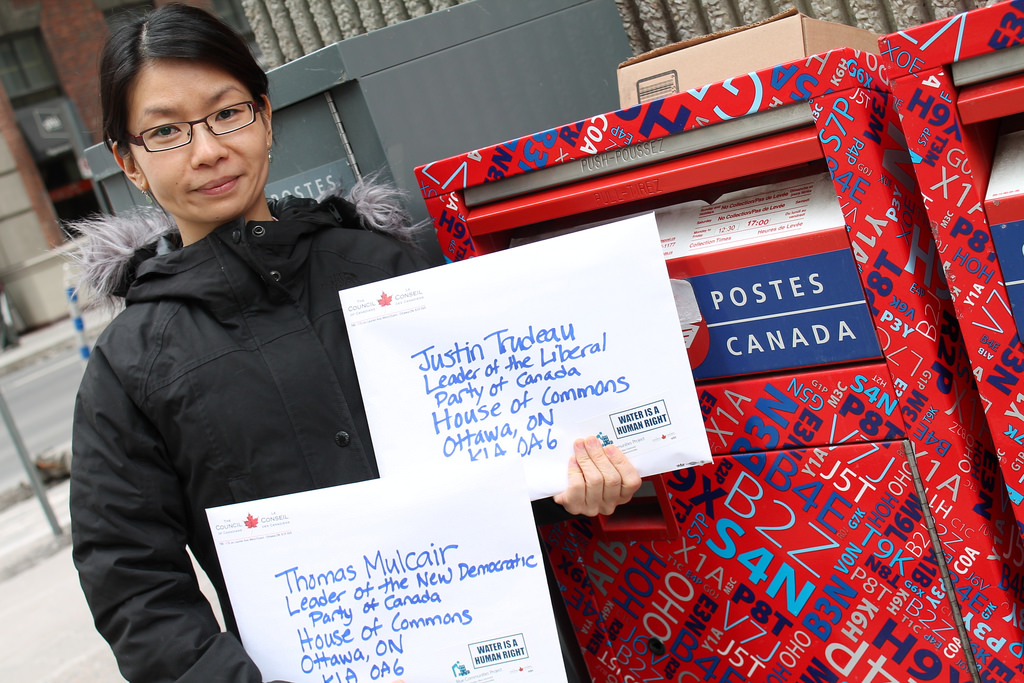You may remember on World Water Day the Council of Canadians sent prime minister hopefuls Justin Trudeau and Thomas Mulcair letters asking them their positions on key water issues along with some reading materials. The Council sent three reports, including Council of Canadians chairperson Maude Barlow’s new report Liquid Pipeline: Extreme energy’s threat to the Great Lakes and the St. Lawrence Seaway, A Fractivist’s Toolkit: How you can take action to protect water and stop fracking and the water chapter of the 2014 Alternative Federal Budget, Striking A Better Balance.
The four questions we asked them were:
• Will you place a ban on fracking to protect the water sources of Canadian and Indigenous communities?
• How will you protect the Great Lakes and the St. Lawrence Seaway from extreme energy projects?
• Will you develop a National Water Policy that implements the human right to water and sanitation and invests the $4.7 billion needed for water and wastewater infrastructure in First Nation communities?
• Will you roll back the changes the Harper government made to environmental legislation and recommit funds needed for water research?
We gave them until Earth Day on April 22 to respond and we heard back from both parties before the deadline.
NDP leader Thomas Mulcair’s letter pointed to their commitment to building a nation-to-nation relationship with Indigenous peoples and calls for mandatory disclosure of fracking chemicals. These commitments are a good first step but given the Council of Canadian Academies’ report which states that we don’t know enough about fracking to declare it safe, we are urging the NDP to commit to a ban or at the very least a moratorium on fracking. Many Canadian and Indigenous communities have been calling for a stop to fracking for years. We recently delivered 16,000 signed petitions calling for a ban on fracking.
We were glad to see that the NDP support full, prior, informed consent of the local communities and an assessment that considers broader regional and national considerations on energy projects impacting the Great Lakes and St. Lawrence. We look forward to the NDP supporting communities that are raising concerns about extreme energy projects like Line 67 (also known as the the Alberta Clipper), which carries tar sands oil from Edmonton, Alberta to Superior, Wisconsin; Line 5, which threatens the Straits of Mackinac; the Energy East pipeline, which cuts through the Great Lakes watershed and Calumet Specialty Products Partner’s plan to build an oil barge dock in Superior, Wisconsin that would ship tar sands and fracked oil across the Great Lakes.
Click here to read the NDP’s answers to our questions on key water issues and the Council of Canadians’ recent letter responding to their answers.
Liberal Party leader Justin Trudeau’s response stated his party’s commitment to “proper review and oversight” as well as evidence-based policies for fracking projects. The Liberals continue to support a National Environmental Assessment of Fracking. While we would welcome a broader National Environmental Assessment of Fracking, we also urge the Liberal Party to support communities’ demands for a freeze on fracking.
For extreme energy projects on the Great Lakes, the Liberals aim to commit to balancing economic development, environmental and socio-economic factors, respect for Aboriginal rights to best meet the interest of Canadians. We urge the Liberal party to respect free, prior and informed consent of communities for extreme energy projects.
Click here to read the Liberal Party’s answers to our questions on key water issues and click here for the the Council of Canadians’ recent letter responding to their answers.
With the federal election less than a year and a half away, we need to ensure that party leaders and members of Parliament take a strong stance on pressing water issues. To read more about fracking, extreme energy in the Great Lakes and other water issues, visit the Council of Canadians website.




